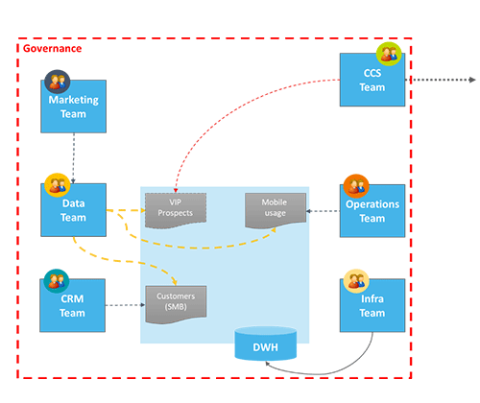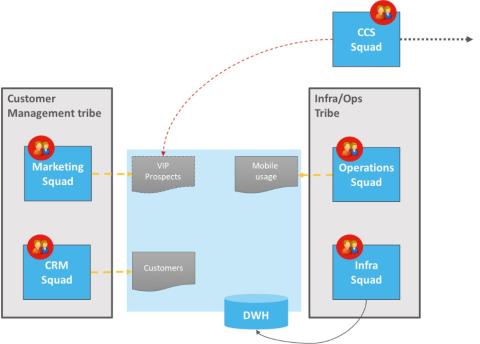Valorise Data with Data Mesh 1/4
In January 2022, McKinsey released a set of characteristics describing a typical 2025 data-driven business. Most of these highlight the need for organisations to effectively process data and therefore maximising the value extraction and its conversion to relevant insights. However, today, data are not systematically handled in an effective way resulting in missed opportunities and a loss of time and money. If centralising data appears to be a natural choice, Data Mesh tends to disrupt the data management space, offering interesting alternative. This series of articles explores the benefits of implementing a data mesh approach.
Data Mesh is a decentralisation paradigm based on a socio-technical architecture. It relies on four principles:
-
Domain-specific knowledge
-
Data considered as product
-
Federated computational governance
-
Data available on a self-serve platform
Let’s go through our use case to illustrate “Domaine specific knowledge”

Our TelCo Marketing Team wants to run a multi-channel campaign with a focus on a specific type of customers. The Marketing team has provided the Data team with the specifications and requirements. The Data team is in charge of building data pipelines and datasets. Data are centralized in a data warehouse maintained by the infrastructure team. Additional data sources are required and maintained by others teams: CRM and Operations for mobile data.
The expertise does not focus on addressing business requirements.
This simple use case presents some challenges and bottlenecks:
-
Tedious process which involves multiple teams can result on a possible loss of information,
-
Data are “locked” by the infrastructure team as they are maintaining the data warehouse,
-
The Marketing team never sees the data
But the biggest challenge is probably the Data team does not necessarily have the appropriate skills to assign the appropriate meaning to the different data sources in use. This is where domain-specific knowledge comes in action.
Bring the business expertise closer to the data
Instead of having the Data team in charge of the data valorisation, we create dedicated squad composed by a combination of Business domain experts and IT specialists. Not only does this cuts the middleman and avoid lost in translation type of situation, but the subject matter experts will bring their knowledge directly which will gain time and be easier to maintain

In our case, the marketing squad will include data analysts and marketing experts, but also Operations specialists who can understand the mobile usage data and a CRM expert. This principle of Domain-specific knowledge facilitates the collaboration within the organisation and enable the increase of data quality and availability by considering data as a product.
[ Data availability and quality will be discussed in the next article]
